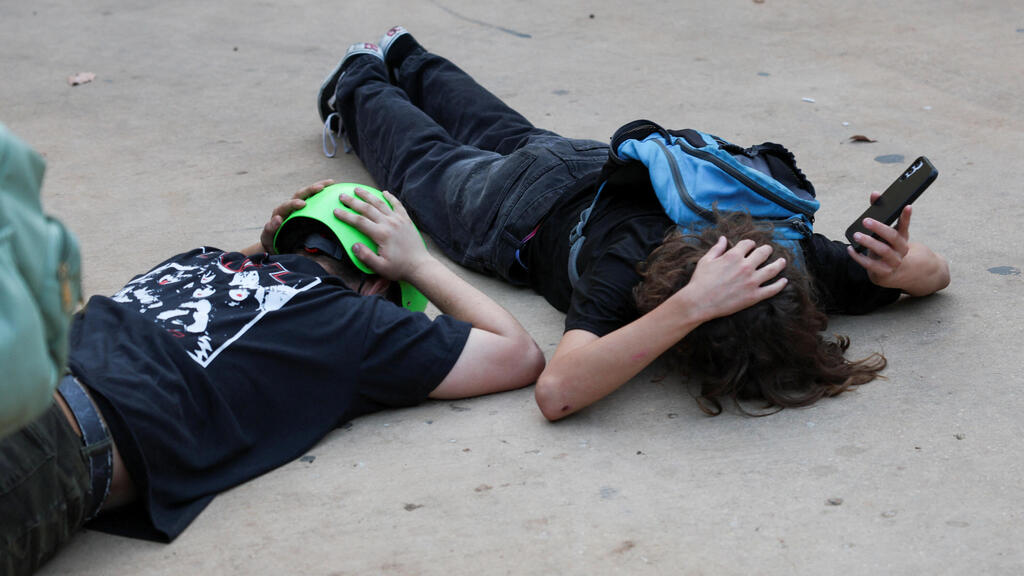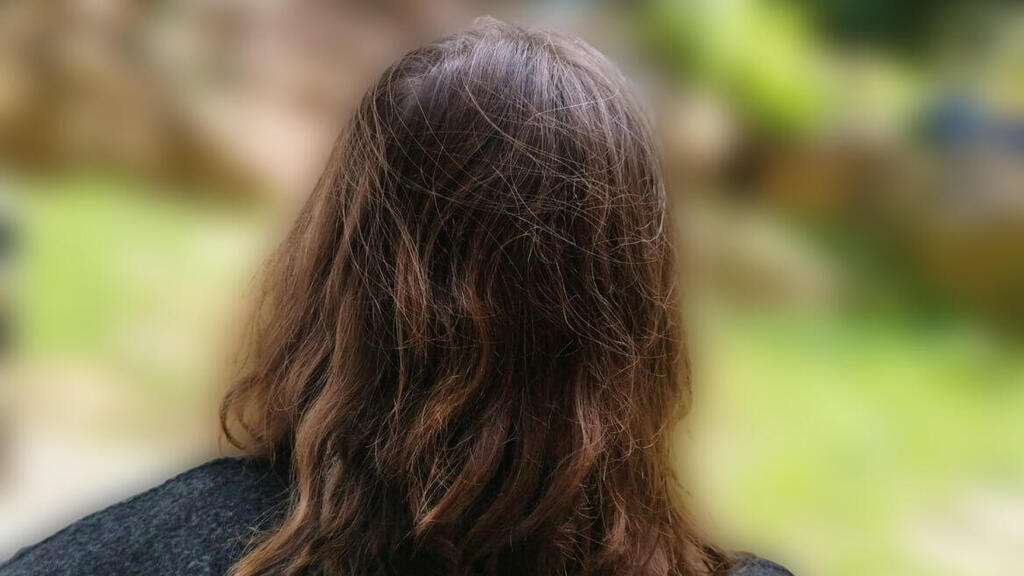Michal, a mother of three, moved with her children to live with relatives in a quieter area when the war began. "We live in the north, and we were in the process of building a house. In the meantime, we were living in a rented apartment without a safe zone," she explained. “After three days of sirens and missile launches shaking the entire house, I felt I couldn’t protect my children or call it ‘safe,’ so we drove away.”
Michal said the impact on her children was especially difficult socially. "They were cut off from all their friends. After a month and a half, we moved in with friends who live near us until our house is ready. It was a period of instability, and we lived out of suitcases."
3 View gallery


Children taking cover during rocket siren in Tel Aviv
(Photo: Reuters/Violeta Santos Moura)
"I thought we were starting to return to some kind of routine, but then I got a call from my son's teacher. He had a panic attack in the middle of an annual field trip. I hoped it was a passing episode, but the next day, he met with friends. One of the mothers had to bring him home because he couldn’t return alone or talk. He’s a normal nine-year-old, but he came home hyperventilating, panting, muttering ‘hush, hush, hush,’” Michal recalled.
"The next day, we woke up to another panic attack—a one-and-a-half-hour episode where he couldn’t communicate, didn’t speak, and just needed quiet. These are things he didn’t experience before the war. For almost nine months now, every time his stress level rises, he has severe panic attacks,” she added.
Michal noted that she’s not receiving help from the state. "Appointments through the HMOs take months. We’re also in the periphery, and everything is busy. I decided I wouldn’t put my child through that, so we found a private psychologist. He’s been in treatment ever since. We pay 350 shekels a week, sometimes twice a week when the situation demands it."
The emotional impact of the war is also following her son into school. "He’s a great student, but now he’s starting to have disciplinary problems. You need to understand that this is a recurring issue, which means we’ll have to deal with it for years to come."
The impact on Israel’s children: A growing crisis
On Tuesday, the Israel National Council for the Child presented new data to the Knesset, ahead of International Children's Rights Day on Wednesday. The report paints a troubling picture of the emotional toll the ongoing war is having on Israel's children.
The data shows that 24% of parents report a significant decline in their child's emotional well-being due to the security situation, with the situation being even more severe in families with reservists. Thirty-two percent of parents in these families say their child's emotional state has worsened greatly.
About 42% of children experience stress and fear at least twice a month due to the security situation, while 16% experience it daily. Fifty-four percent of children feel stressed and fearful following air raid sirens, with 46% able to return to their routine afterward. However, 8% struggle to regain focus for hours. The situation is even worse in Arab communities, where 18% of children rarely leave their homes, and half of them have limited social interactions.
Roughly 85% of parents report that their children have experienced physical, mental, and behavioral symptoms that have worsened due to the security situation. Nearly 40% of children are struggling with irritability, sleep disorders, and restlessness. Around 28% exhibit aggression or anger outbursts, and approximately 41% have developed physical symptoms, such as stomach aches, headaches, and increased heart rates. A quarter of parents reported that their children’s eating habits have changed, including overeating, emotional eating, or fasting.
Exposure to trauma and violent content
About 19% of children know someone who has been killed, injured, or kidnapped during the war. Two in five children have been exposed to violent or terrorist content online or on social media. This exposure increases with age, with 63% of children aged 14-17 encountering such content.
The data is based on a survey of 504 parents of children aged 6-17 and was presented to the Knesset’s Child Rights Committee. "The findings paint a painful picture, illustrating that real victory or recovery should not only be discussed in military terms but also in social terms, with children and youth at the center of attention," said CEO of the Israel National Council for the Child Attorney Vered Windman.
“The events of the October 7 massacre, the kidnappings, brutality, and ongoing war, along with the deaths, injuries, abductions, and the constant fear for life, have a dramatic effect on children and youth. This impact is evident across Israel, with a significant group of children and youth needing treatment but unable to access it due to long waiting times or inability to afford care. This issue has immediate consequences and will have even more serious long-term effects.”
Educational and emotional gaps for northern children
Hadas, a mother of three from northern Israel, says the educational gaps have become especially noticeable. "I have a teenage son, and I feel he’s in denial about what’s happening. My daughter, on the other hand, acts like everything is fine, but since the war started, she’s been sleeping next to us again. Everything is fine during the day, but at night, her fears emerge. She’s become more sensitive and absorbs everything around her."
Regarding education, Hadas believes the gaps are growing wider. "Last year, children in the north only attended school for about two-thirds of the year. This year started, and how much have they learned? About two weeks. Since the escalation began, schools have been closed. They’re learning through Zoom. What can they learn in just four hours of Zoom lessons? If they manage to retain some knowledge, that will be amazing. I don’t know how they’ll close the gap. Learning on Zoom, with an air raid siren going off, and having to rush to a safe room before returning to focus—it’s just not feasible. It’s not just about education; it's about the emotional toll as well."
She continues, "It’s hard to imagine what we’re going through unless you’re living it. We’re in a reality where we’re targeted all day long. I feel invisible, and so do our children. Only now, after a year, am I starting to see resources for resilience starting to arrive."
Psychologist Widemann highlighted the crucial role of the education system during such crises. "It’s clear how important the education system, particularly teachers, are for children and youth, especially when it comes to helping them cope with emotional, social, and academic challenges," she said. "Tomorrow marks International Children’s Rights Day. It’s a reminder to the state of its obligations to children. The government’s role is to help children deal with the effects of war. The 2025 budget must specifically address this and provide support for the emotional and psychological needs of children. This is their right, and it’s unquestionably the state’s responsibility."
Get the Ynetnews app on your smartphone: Google Play: https://bit.ly/4eJ37pE | Apple App Store: https://bit.ly/3ZL7iNv




